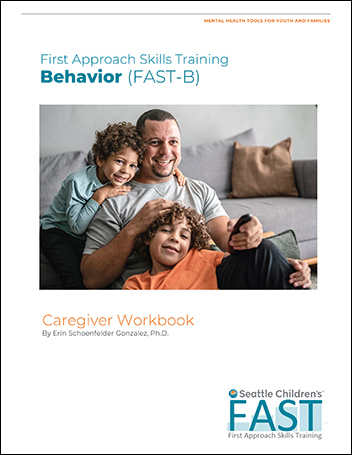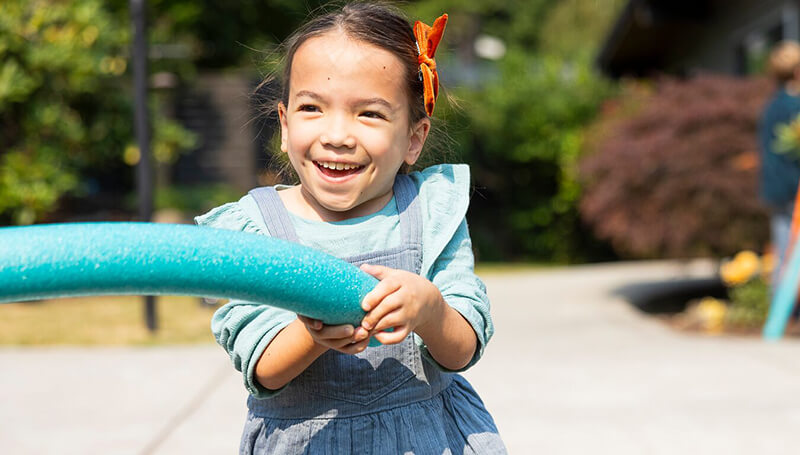First Approach Skills Training: Behavior Basics
An on-demand, self-paced class for parents and caregivers of children ages 5 to 12 with disruptive behaviors
Class Description
In the First Approach Skills Training: Behavior Basics on-demand virtual class, experts from our Behavior and Attention Management Program share best practices and practical tips you can use right now at home to help your child with behavior challenges such as not following instructions, arguing, trying to get negative reactions and more.
Cost
The class is free.
Class Format
The class is made up of 8 core skill videos and 3 bonus skill videos that you can watch at your own pace. All videos are between 3 and 5 minutes long. There is a follow-along workbook (PDF) with information and exercises that you can use while you watch the skills.
After you have watched the videos, please provide feedback by taking quick our class survey (this should take no more than 1 minute to complete).
It’s best to watch the videos in order, as they build on each other. You can also watch the modules again at a later time (in any order).
Skill 1: Causes of Child Behavior Problems
Identify the many factors that lead to challenging behavior in children and learn how to create a plan to support your child. Watch now.
Skill 2: Special Time
Understand what special time is and how it can help your child learn positive behavior, strengthen your parent-child relationship and make your parenting skills more effective. Watch now.
Skill 3: Supercharging Praise
Learn why giving your child extra praise can help build your child’s self-esteem and motivate them to meet expectations. Watch now.
Skill 4: Planned Ignoring
Discover what planned ignoring is, why it is a helpful behavior basics technique and how to do it. Watch now.
Skill 5: Supercharging Instructions
Learn why giving clear instructions is important and helps you break down tasks into short, specific steps that will set your child up for success. Watch now.
Skill 6: When/Then Instructions
Understand what when/then instructions are and why they are a helpful behavior basics technique. Pairing naturally motivating rewards with more boring tasks helps your child be more independent. Watch now.
Skill 7: Privilege Pause
Discover what privilege pause is and how using short, powerful pauses can help your child learn clear limits for behavior. Watch now.
Skill 8: Time Out
Understand how and why time out is the most effective tool to set limits and allow everyone to calm down when dealing with challenging behaviors. Watch now.
Bonus Skill 1: Managing Screen Time
Learn how to set healthy boundaries and improve your child’s behavior when it comes to screen use. Watch now.
Bonus Skill 2: Emotion Coaching With Big Feelings
Discover how using emotional moments are a chance to connect with your child and teach them about feelings. Watch now.
Bonus Skill 3: Boosting Your Child’s Sleep
Understand how to help your child get more sleep, which can improve their behavior and health. Watch now.
Please Give Us Feedback
After you have completed the class modules, please provide feedback by taking our quick class survey (this should take no more than 1 minute to complete).
Class Resources
Frequently Asked Questions
-
What if I need additional help to use these skills?
Most families will benefit from the input of a mental health provider to make First Approach Skills Training: Behavior Basics skills work well. Talk with your primary care provider about parent behavior management training with a mental health provider, or the possibility of working with a behavioral health provider in your child’s primary care clinic to review the First Approach Skills Training: Behavior Basics workbook (PDF).
-
My child’s behavior is explosive and can be aggressive. Will this program help?
The First Approach Skills Training: Behavior Basics class is a great starting point for helping with disruptive behavior, including aggression. The program skills can improve your child’s motivation to follow instructions and get positive attention from you. It can also help you set limits with aggressive behavior. Severe behaviors are likely to require input from a mental health professional. Speak with your child’s primary care provider about a referral to Seattle Children’s Behavior and Attention Management Program.
If you are concerned that your child or a family member is at risk of immediate harm from your child’s aggression, please take your child to the nearest emergency department for further evaluation and crisis support.
-
Will the First Approach Skills Training: Behavior Basics class help if my child has attention deficit hyperactivity disorder (ADHD) or oppositional defiant disorder (ODD)?
Yes. The class is based on parent behavior management training, which is the leading evidence-based behavioral treatment for both ADHD and ODD, as well as general or non-diagnosed child behavior or relationship problems.


